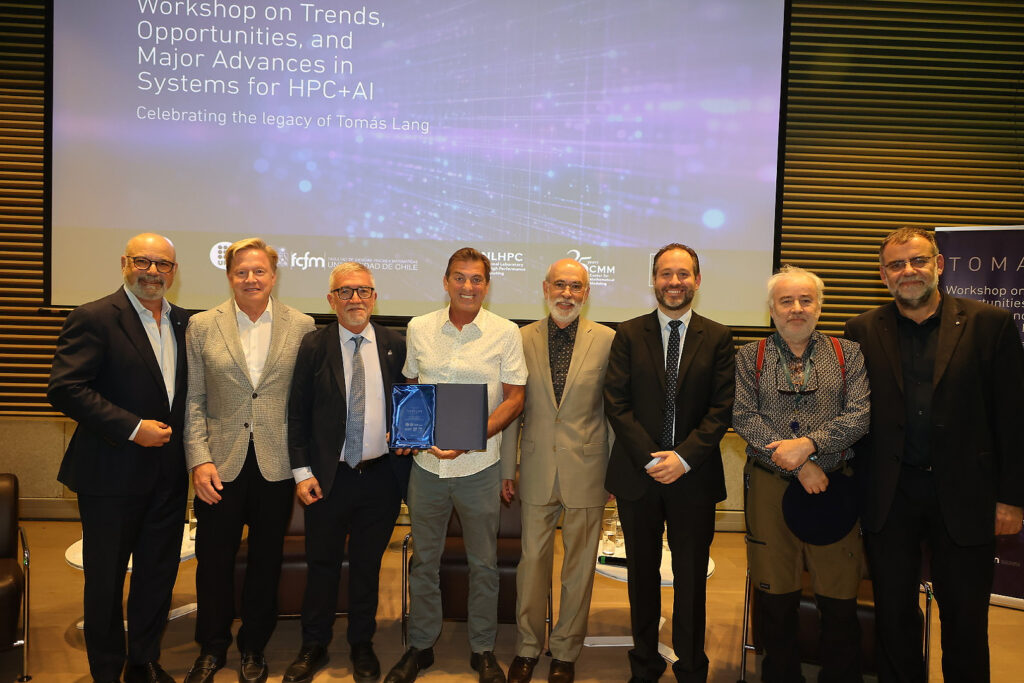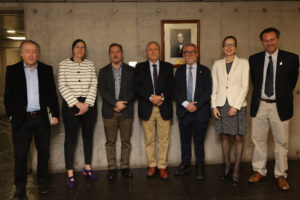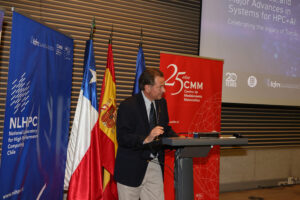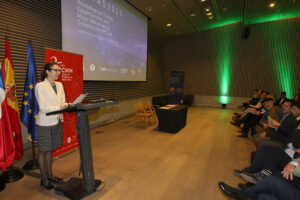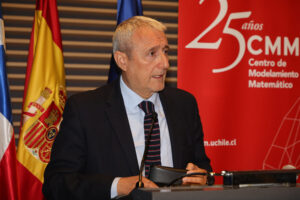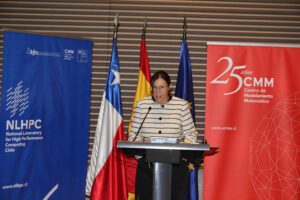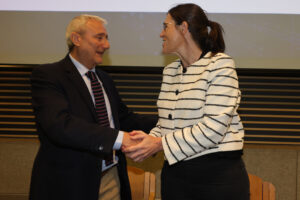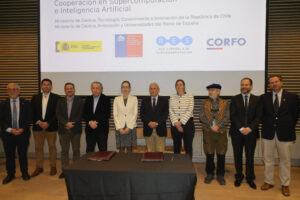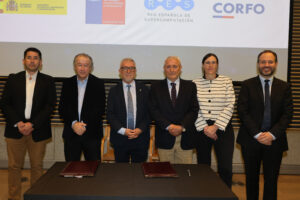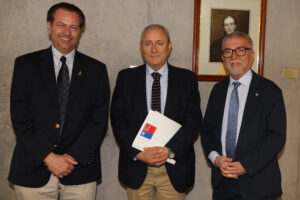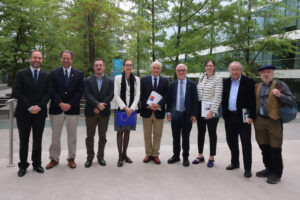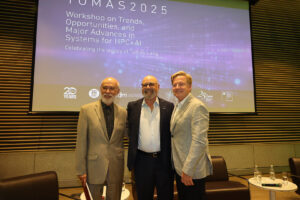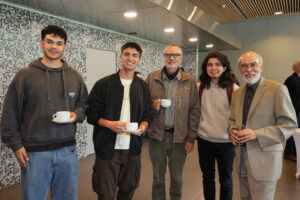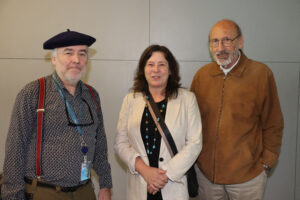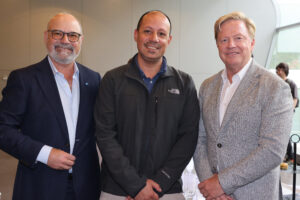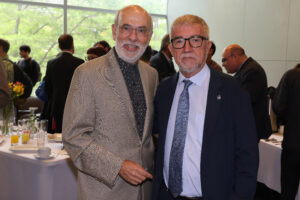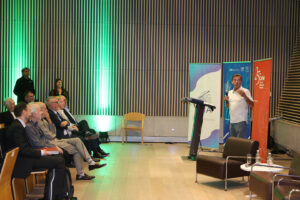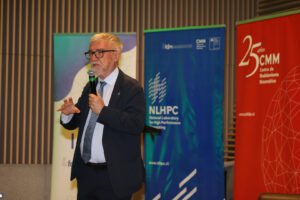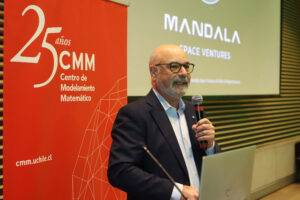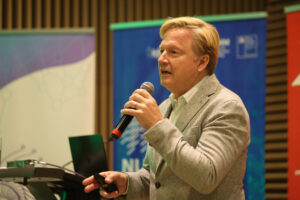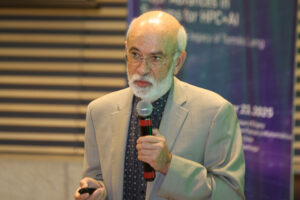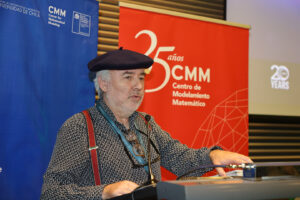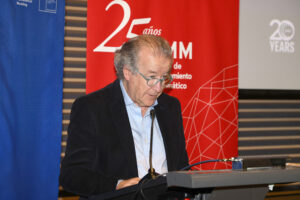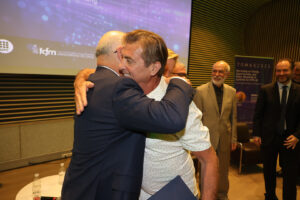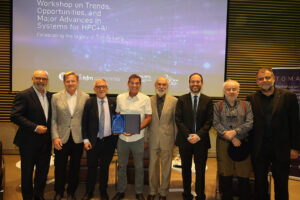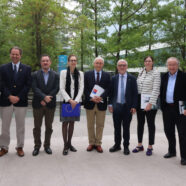
The Workshop on Trends, Opportunities, and Major Advances in Systems for HPC+AI, organized by the National Laboratory for High Performance Computing (NLHPC) of the Center for Mathematical Modeling (CMM) at the Faculty of Physical and Mathematical Sciences (FCFM), University of Chile, served as the stage to honor the legacy of Professor Tomás Lang, a distinguished engineer from the University of Chile and internationally renowned academic whose pioneering work in computer arithmetic and digital architecture laid the foundations for modern high-performance computing.
In this context, a historic agreement between Chile and Spain was formalized through the signing of a Memorandum of Understanding (MoU) that establishes bilateral cooperation in the fields of supercomputing and artificial intelligence.
This milestone event was attended by Aldo Valle, Minister of Science, Technology, Knowledge, and Innovation of Chile; Prof. José Correa Haeussler, Vice-Rector for Information Technologies at the University of Chile; Prof. Héctor Ramírez, Director of the Center for Mathematical Modeling (CMM); Prof. Mateo Valero, Director of the Barcelona Supercomputing Center (BSC); Laura Oroz, Ambassador of Spain to Chile; and Claudia Gintersdorfer, Ambassador of the European Union to Chile.
Chile–Spain Cooperation
The Memorandum of Understanding (MoU) formalizing bilateral cooperation in supercomputing and artificial intelligence development marks a significant milestone that strengthens Chile’s position as a regional leader and enhances the exchange of capacities, infrastructure, and scientific knowledge with Europe.
The signing of this MoU aligns with the EU–LAC HPC Network, ensuring that participating countries share resources, develop joint projects, and promote interoperability with European infrastructures.
Ginés Guerrero, Executive Director of the NLHPC, highlighted: “It is a tremendous milestone to have formalized two high-level agreements —the EU–LAC Network and this commitment with Spain— in just three weeks. This achievement is the result of years of collaborative work led by the NLHPC. The MoU formalizes Spain’s support for Chilean supercomputing initiatives, allowing us to open new opportunities for scientific and technological innovation and research. It is, in essence, the diplomatic platform that enables Chile to maximize its HPC capabilities and actively contribute to advancing global cutting-edge research networks, strengthening the projection of our projects across the region.”
EU–LAC High Performance Computing Network
During the event, the EU–Latin America and the Caribbean High Performance Computing Network (EU–LAC HPC Network) was also presented — an initiative aimed at strengthening international cooperation between high-performance computing (HPC) centers in Europe and Latin America. The initiative will be funded through the project “High Performance Computing: Establishing an EU–LAC Supercomputing Network for Artificial Intelligence (AI)”.
This announcement in Santiago follows the official launch of the Network at the Global Gateway Forum held in Brussels on October 9–10, 2025.
The new network’s main goals are to optimize the use of existing HPC resources and promote interoperability with the European ecosystem (EuroHPC JU), thereby strengthening scientific collaboration in key areas such as climate modeling and AI. It will also foster capacity building and digital infrastructure integration across both regions. The initiative is coordinated by the Barcelona Supercomputing Center (BSC) and, on behalf of Chile, will be implemented by the National Laboratory for High Performance Computing (NLHPC) of the University of Chile and the National Center for Artificial Intelligence (CENIA).
Its launch in Chile reaffirms the European Union’s commitment to digital transformation, AI, and scientific excellence in Latin America and the Caribbean, within the framework of the Global Gateway strategy. In this regard, Claudia Gintersdorfer, Ambassador of the European Union to Chile, highlighted the importance of this partnership: “The creation of the EU–LAC HPC Network promotes a sustainable, inclusive, and human-centered digital transformation based on knowledge and mutual trust. We are proud to stand alongside Chile, Spain, and all our Latin American partners in building this shared digital future”.
The Ambassador of Spain, Laura Oroz, emphasized Spain’s “commitment to disruptive technologies for growth and well-being, such as supercomputing.”
This commitment is reflected in initiatives such as Quantum Spain—led by the BSC—and the recent approval and installation of an AI Factory for Healthcare at the Galicia Supercomputing Center, with investments of €8 million and €24 million, respectively.
She added that “Spain’s experience can contribute valuable expertise to Latin America through network-based collaboration, which in turn has the potential to expand cooperation among countries in the region.”
Prof. José Correa Haeussler, Vice-Rector for Information Technologies at the University of Chile, stated: “The European Union has formally recognized Chile’s commitment to high-performance computing, positioning us as a key partner in this strategic network. The NLHPC of the University of Chile, in close collaboration with CENIA, will implement the agreement in the country. This bi-regional platform places us as an essential partner for technical exchange: it enables access to the infrastructure and knowledge of leading centers such as the Barcelona Supercomputing Center, while Chile’s experience becomes a valuable contribution to the articulation and strengthening of HPC throughout Latin America and the Caribbean.”
Details of the EU–LAC HPC Network
The EU–LAC HPC Network builds upon the success of the Ibero-American Network for High Performance Computing (RISC2, 2021–2023), which laid the groundwork for dialogue and collaboration between HPC centers in Europe and Latin America.
In its initial stage, the network will involve seven countries in the region with strong national plans in HPC and AI: Argentina, Brazil, Chile, Colombia, Costa Rica, Mexico, and Uruguay.
The European Union has allocated €3 million in initial funding through a Contribution Agreement with EuroHPC JU, with an additional €3 million investment planned to strengthen HPC ecosystems in Latin America and the Caribbean.
The effort also includes initial contributions from Spain (€1 million) and Brazil (€8 million).
In terms of connectivity, the network will leverage the BELLA cable, which links Europe and Latin America and provides the high-speed digital backbone essential for data-intensive scientific cooperation.
Remembering Tomás Lang
The workshop also included a tribute to Professor Tomás Lang, a distinguished engineer from the University of Chile and renowned academic with strong international ties, whose pioneering work in computer arithmetic and digital architecture laid the foundations for modern high-performance computing.
The event featured the participation of Mateo Valero, Director of the Barcelona Supercomputing Center (BSC); Marc Tremblay, Corporate Vice President at Microsoft; Jaime Moreno, Emeritus Researcher at IBM Research; and Leon Alkalai, former researcher at NASA’s Jet Propulsion Laboratory (JPL) and founder of Mandala Space Ventures. The four guests reflected on the career and legacy of the distinguished engineer, sharing anecdotes and personal memories as his colleagues and friends.
Mateo Valero, Director of the Barcelona Supercomputing Center (BSC), remarked: “Professor Tomás Lang founded the Department of Computer Architecture at the Polytechnic University of Catalonia. His leadership was essential in making this department one of the best in the world, inspiring other academic groups across Spanish universities to follow his ideas on teaching and research. He also motivated academic communities throughout Europe to develop world-class research, like that fostered in Barcelona. His technical teachings, combined with his ethical integrity and human values, created an unimaginable school of thought. The Barcelona Supercomputing Center itself is the fruit of that legacy. Without Tomás, none of this would have been possible. He was our teacher and our friend”.
We invite you to explore the photo gallery of the event:
Written by: CMM Communications – Embassy of Spain – Delegation of the European Union in Chile
Photos by: NLHPC and CMM
Posted on Oct 24, 2025 in News




 Noticias en español
Noticias en español

